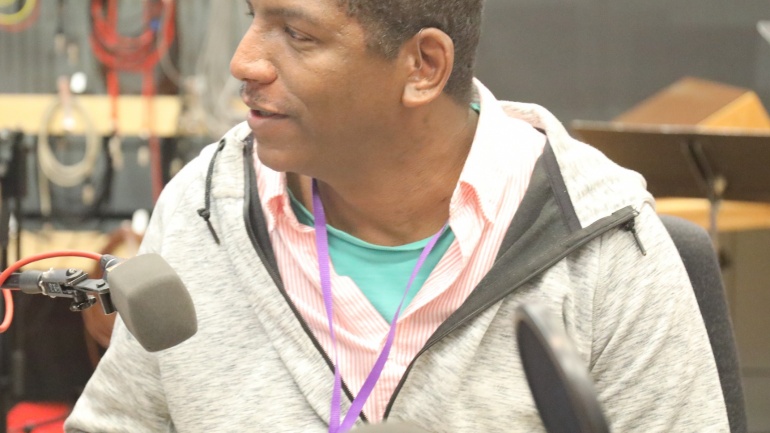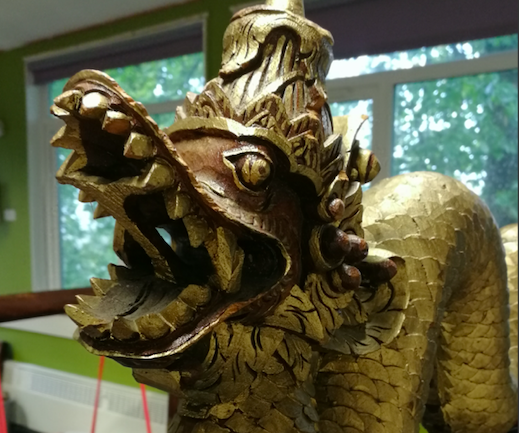No. 8 in our blog series exploring creative approaches to transforming the criminal justice system.
Author: Russ Haynes, radio show host and Good Vibrations past participant
I often wonder what the purpose of putting someone in prison is. The answer may appear obvious – punishment. Is it to teach someone a lesson? If so, then surely when a sentence is finished, you are a reformed person and good to go on your way. But in the UK we have a high reoffending rate. About 29% of people who are released from prison will reoffend within the first year. So where are we going wrong as a society?
I’ve heard people say prison isn’t tough enough. That it is like a hotel room. If your hotel room is like prison then you’re staying at a no star reviewed place and you definitely need to book another hotel. I served one year in prison. When it came to an end, I was left wondering what on earth it was all about. I know I did wrong. I accepted that. But I was confused about what I was supposed to get out of it.
One of the hardest things was the boredom. I developed a routine that I stuck to throughout my sentence. I read the newspaper slowly in the morning. Then, the afternoon I spent reading a book and watching a bit of TV. In between I did the prison work. It helped speed up the waiting time.
I also learned to protect myself and not allow feelings to be felt. I hid behind a brick wall in my mind to cope with the situation. I did my best not to be noticed by the people around me. I didn’t trust anyone. When I left prison, I kept that wall up. It was hard to break down and I didn’t know how. It was my way of coping, not allowing myself to get hurt, and because of that it was hard to feel love for my partner or my daughter.
I tried to navigate this new chapter in my life, but was struggling to carry on. My confidence and self-esteem were shattered and everything I had ever known had ended – my career, friends, hope and ambition. I take no sympathy for how I ended up in the situation. The fault was purely mine. Even though I had a partner and child waiting for me, I was lost and had no idea what I had to offer this world. My mind rushed with negative thoughts.
I really tried to adjust, but my life had changed forever. No matter how hard I tried to move on and create a new path for myself, the system stopped me at every turn, and made it as difficult as possible for me. Despite all the negative feelings I had about myself, I wanted to work and create a new life for me and my family, but there was always something blocking my way forward.
The criminal justice system doesn’t seem to be set up for people who want to learn from their mistakes and use the experience for growth and personal development. It is more focussed on punishment than on promoting rehabilitation. Any talk of redemption was met with scepticism and distrust. I was exhausted by all the hoops I had to jump through and hurdles I had to avoid just to get a job, make decisions, or be with my family.
I had loads of ideas to create my own business. However, the rules I had to follow held me back and prevented me from achieving that. Within months my ambition had faded and I had given up. I saw no future. I was tired of trying to be positive, and I fell into depression and anxiety. My mistrust grew of everyone around me. I hated my situation and I hated myself. Alone, and feeling I had no support, I took an attempt on my life to be free from the pain.
Luckily, I was found and rushed to the hospital. I was sectioned, which ironically gave me the break I needed. I used this time to calm down, reassess my situation and create a new plan for going forward.
Prison shouldn’t break you. It should give you the time to revaluate, and inspire you to make positive choices that benefit you and the society you live in. It should offer guidance, advice and motivation to succeed when you leave, so you will want to make a better version of yourself. But prison left me angry, resentful and suspicious. It bred negativity, stripped me of my self-worth and brought my worst traits to the forefront.
How can we make the criminal justice system about rehabilitation instead?
We need to have experienced people from all backgrounds – including those who have lived in prison – working together on reforming the system to make it more effective. As long as decisions are solely made by people who have never had experience of committing a crime, hitting rock bottom, or anything that can relate to why people commit crime, things will never improve.
We need to make the court process more human. The traditions of the courtroom, including the gowns and wigs, are simply alienating to someone who is about to lose their liberty. We need to be more sensitive to people’s emotional and mental wellbeing when deciding what a suitable sentence is for them.
We need to push arts in education, not just academic achievement. That will allow creative expression and a useful outlet for those inside. We need to create more opportunities for people whilst they are inside that give them the skills and mind frame to help them move forward when they leave. We need to hire prison officers and staff who are committed to rehabilitation.
We mustn’t use family visiting times as a weapon to make people behave. We need to realise the importance families play in encouraging rehabilitation and the damage it causes children when we prevent them from seeing their parents. We need to create better family visit areas in prisons that don’t leave children traumatised.
We need to stop punishing people after they’ve left prison, and stop setting impossible tasks for them to follow and putting out traps to get them back in. We need to fine companies who use someone’s past to remove them from employment, and reward companies that actively seek to employ those with a criminal background. I’m in favour of abolishing the criminal record. I feel it only serves the purpose of labelling people and allowing them to legally be discriminated against.
As long as someone does not pose a realistic ongoing risk, once their sentence has been completed then that should be it. They should be able to move on without any prejudice. That would inspire and encourage those who find themselves within the system to work their way out of it and become valued members of society.
It has been over 12 years since I finished my sentence and I’m still finding it difficult to move on. I have no trust in the system and think it is one of the UK biggest failures. That and the Covid response and also possibly Greggs.
_______
Good Vibrations has worked in prisons and young offender institutions since 2003. We see the destructive effects on people of living within our overstretched, under-resourced criminal justice system. We want to understand how people can be better supported before, during and after their contact with the criminal justice system. We have commissioned a series of blogs from a range of experts, including those with lived experience and their families. Every Thursday for the next four months, we will bring a different voice with their own unique perspective and ideas. At the end of the series we will publish a report drawing together the themes and recommendations.

